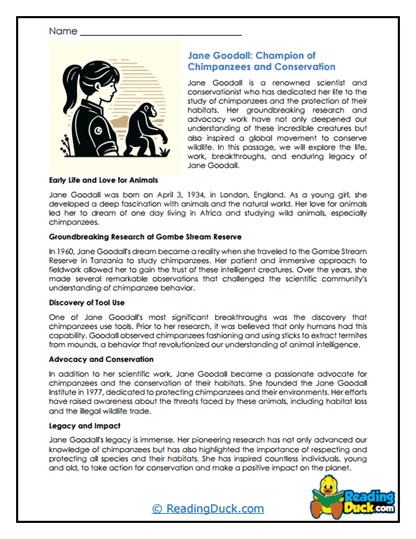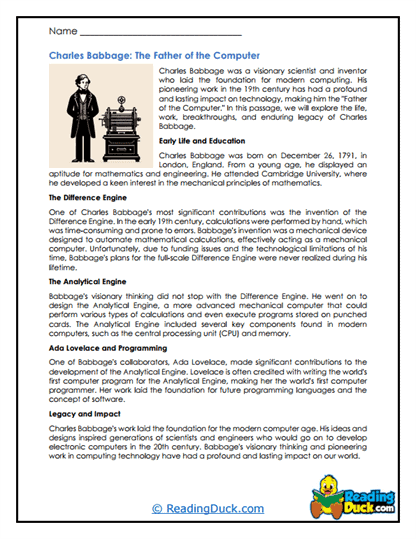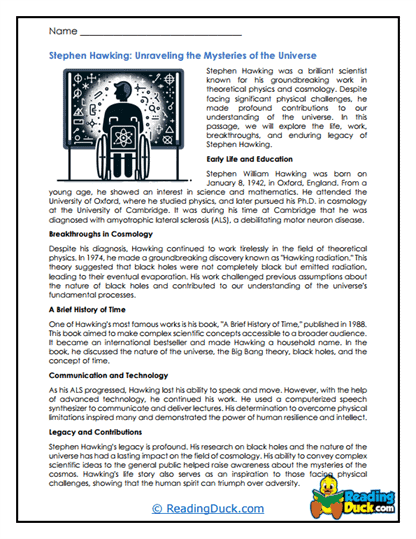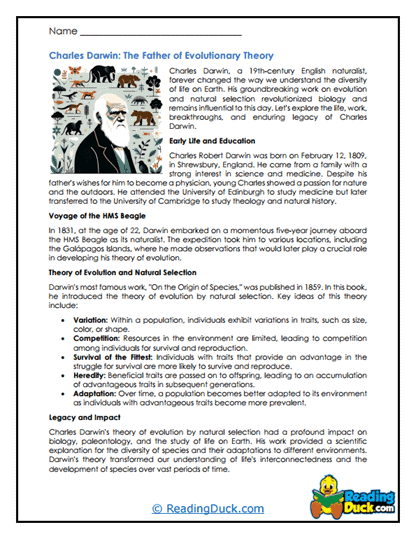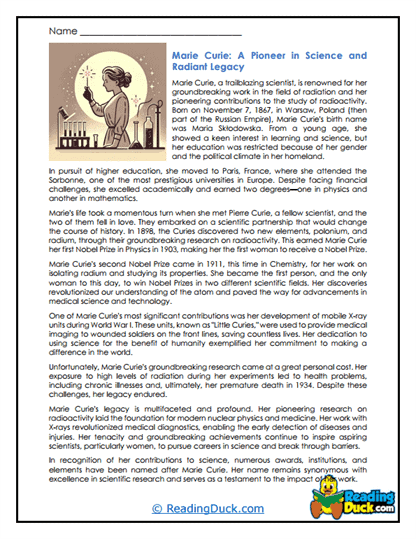Scientists Worksheets
About Our Scientists Worksheets
Our Scientists worksheets offer an engaging and comprehensive exploration of the lives and achievements of some of the most influential figures in the world of science. These worksheets are designed to inspire students by providing detailed insights into the personal journeys, groundbreaking discoveries, and lasting legacies of scientists who have shaped our understanding of the natural world. By studying the lives of these notable figures, students can gain a deeper appreciation for the scientific process and the impact that scientific advancements have had on society.
Each topic in our Scientists collection contains several worksheet sets, each thoughtfully crafted to enhance students' comprehension and connection to the material through a variety of activities. These sets include:
- Multiple Choice Questions: These questions assess students' understanding of the reading passages, focusing on key facts about the scientist's life, career, and contributions to their field. This format helps reinforce students’ knowledge and encourages them to engage with the material in detail.
- Short Answer Questions: This format challenges students to reflect on what they’ve learned by writing their responses in their own words. These questions encourage deeper thinking and help students articulate their thoughts and insights about the scientist's influence and achievements.
- Open-Ended Questions: These questions invite students to explore their personal responses to the material, asking them to express opinions, preferences, or interpretations related to the scientist's experiences and legacy. This format fosters critical thinking and allows students to connect with the content on a more personal level.
Each worksheet set is designed to assess students’ understanding while enhancing their engagement with the topic. An answer key is provided for every question sheet, making it easy for educators to review and evaluate students’ progress. All worksheets are available as PDF files, which can be easily viewed electronically, downloaded, and printed.
Pioneers of Discovery: Exploring the Lives and Legacies of the World’s Greatest Scientists
Scientists are the architects of knowledge, driven by curiosity and a passion for discovery. Their work has led to some of the most important advancements in human history, from understanding the laws of physics to developing life-saving medical treatments. When introducing students to the world of scientists, it’s essential to highlight how these individuals have not only expanded our understanding of the universe but also improved the quality of life for people around the world. Scientists embody the values of critical thinking, perseverance, and innovation, serving as role models for anyone interested in exploring the mysteries of the world.
Key Aspects of Scientists and Their Contributions:
- The Role of Scientists in Advancing Knowledge: Scientists play a crucial role in the development of human knowledge by conducting research, performing experiments, and formulating theories that explain natural phenomena. Their work lays the foundation for technological advancements, medical breakthroughs, and a deeper understanding of the world around us. Students should understand how scientists have contributed to various fields, including physics, chemistry, biology, and environmental science. By learning about these contributions, students can appreciate the importance of scientific inquiry in driving progress and solving complex problems.
- Influential Scientists Across Disciplines: The history of science is rich with remarkable individuals who have made significant contributions across different fields. Figures like Isaac Newton in physics, Marie Curie in chemistry, and Charles Darwin in biology have redefined our understanding of the natural world and opened new avenues of exploration. Exploring the stories of these scientists helps students appreciate the diversity of scientific inquiry and the impact that these individuals have had on the world.
- The Scientific Process: Scientific discovery is not a straightforward path; it involves rigorous experimentation, hypothesis testing, and the refinement of ideas. Students should explore how scientists navigate the scientific process, often facing challenges such as limited resources, peer skepticism, and the need for reproducible results. By understanding the scientific process, students can gain insights into the perseverance and critical thinking required to contribute to the body of scientific knowledge.
- Cultural Impact and Legacy: Beyond their scientific achievements, scientists have had a profound impact on culture and society. Their discoveries have influenced everything from philosophy and ethics to technology and public policy. For example, Albert Einstein’s theory of relativity revolutionized our understanding of space and time, while Jonas Salk’s development of the polio vaccine saved millions of lives. Recognizing the cultural significance of scientists helps students see the broader impact of scientific discovery on society and how it can shape the course of history.
- The Challenges of Scientific Research: While scientists are often celebrated for their discoveries, they also face numerous challenges, including ethical dilemmas, funding limitations, and the pressure to publish results. Students should explore the obstacles that scientists encounter and how they overcome these challenges to achieve success. This perspective helps students develop a more nuanced understanding of the scientific field and the resilience required to make meaningful contributions.
By exploring these key aspects of scientists and their contributions to society, students can develop a well-rounded understanding of the scientific process and its significance. They will learn to appreciate the technical skills, creativity, and determination that scientists bring to their work. This knowledge not only enhances their education but also fosters a deeper connection to the stories of those who have expanded the frontiers of human understanding.
How to Effectively Use These Worksheets
To effectively incorporate our Scientists worksheets into your curriculum, here are some tips for teachers and parents:
- Thematic Lessons: Create themed lessons around specific scientific disciplines, eras, or milestones in scientific history. For example, explore the Scientific Revolution, focusing on how scientists like Galileo Galilei and Johannes Kepler challenged established beliefs and laid the groundwork for modern science.
- Comparative Analysis: Encourage students to compare and contrast the discoveries and contributions of different scientists. This could involve examining the differences between scientists from different fields, or how various scientific theories have influenced each other over time.
- Interactive Discussions: Pair the worksheets with discussions about the ethical implications of scientific research and the responsibilities of scientists. This helps students critically evaluate the impact of scientific discoveries on society and consider the potential consequences of new technologies.
- Creative Projects: Assign creative projects where students can design their own scientific experiments, create presentations on a scientist’s contributions, or write essays on the future of scientific research. These hands-on activities allow students to apply what they’ve learned in a practical and engaging way.
- Cross-Disciplinary Connections: Link the study of scientists with other subjects such as history, philosophy, or environmental studies. For example, discuss the historical context in which a scientific discovery was made, or explore the philosophical questions raised by advancements in genetics or artificial intelligence.
- Group Discussions: Use the open-ended questions in the worksheets as prompts for group discussions. Encourage students to share their thoughts on the contributions of scientists, the challenges they faced, and the impact of their work on society. These discussions can help students develop critical thinking skills and learn to articulate their opinions effectively.
- Assessment and Feedback: Use the multiple choice and short answer questions to assess students’ understanding of the material. Provide personalized feedback that highlights their strengths and areas for improvement, helping them grow as both students and future scientists.
By using these strategies, teachers and parents can help students gain a deeper understanding of the scientific process, develop critical thinking skills, and foster a lifelong curiosity about the natural world. The Scientists worksheets are a valuable resource that can be integrated into a variety of educational settings, making the study of biographical details and the history of science accessible and engaging for all students. Through consistent practice and exploration, students will not only learn about the great scientists of the past and present but also develop a greater appreciation for the role of inquiry, perseverance, and innovation in shaping the future.
